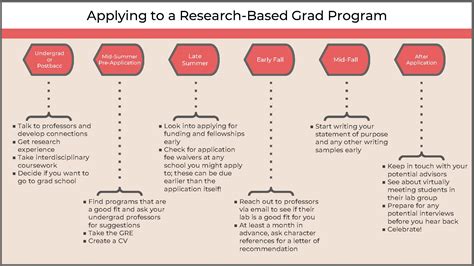Definition and Purpose
A graduate program refers to a formal academic course of study that typically follows the completion of an undergraduate degree, such as a bachelor’s degree. It aims to provide advanced knowledge and specialized skills in a particular field, enhancing professional qualifications and enhancing career opportunities. Graduate programs typically lead to a master’s, doctoral, or professional degree.

Types of Graduate Programs
There are various types and specializations within graduate programs, each designed to meet the specific needs of students pursuing different career paths.
-
Master’s Programs: These programs typically require two years of full-time study and culminate in a master’s degree. Master’s programs offer a deeper understanding of a specific field and may focus on research, professional practice, or both.
-
Doctoral Programs: Doctoral programs, including PhD and EdD degrees, are research-intensive and typically require four to seven years of study. These programs prepare individuals for careers in academia, research, or highly specialized roles in various fields.
-
Professional Degrees: Professional degrees, such as Master of Business Administration (MBA), Master of Science in Nursing (MSN), and Juris Doctor (JD), are specifically designed to prepare graduates for careers in specific professions. These programs typically emphasize applied knowledge and practical skills.
Admission Requirements
Admission to a graduate program is competitive, and requirements vary depending on the institution and program. Generally, applicants must have:
- Completed an undergraduate degree with a strong academic record
- Maintained a high GPA
- Passed standardized tests, such as the GRE or GMAT
- Submitted a personal statement
- Provided letters of recommendation
Program Duration and Cost
The duration and cost of a graduate program vary widely. Master’s programs typically take two years, while doctoral programs can take four to seven years. The cost of tuition and other fees also varies significantly depending on the institution, program, and location.
Research-Based vs. Coursework-Based Programs
Graduate programs can be divided into two main categories:
-
Research-based programs: These programs focus on original research and culminate in a master’s thesis or doctoral dissertation. Students conduct independent research under the guidance of a faculty mentor.
-
Coursework-based programs: These programs emphasize coursework and may include a capstone project or internship. They are designed for students seeking to enhance their knowledge and skills in a specialized field.
Online vs. In-Person Programs
In recent years, online graduate programs have become increasingly popular, offering flexibility and accessibility to students with busy schedules or geographical constraints. However, in-person programs still provide valuable opportunities for face-to-face interaction and networking.
Benefits of Graduate Education
Pursuing a graduate degree offers numerous benefits:
-
Enhanced Career Prospects: Graduate programs provide specialized knowledge and skills that increase job opportunities and career advancement potential.
-
Higher Earning Potential: According to the U.S. Bureau of Labor Statistics, individuals with a graduate degree earn significantly more than those with only a bachelor’s degree.
-
Personal and Intellectual Growth: Graduate programs challenge students intellectually and encourage critical thinking, problem-solving, and leadership skills.
Tips and Tricks
- Research different programs and schools thoroughly before applying.
- Consider your career goals and choose a program that aligns with them.
- Build a strong academic record and prepare for standardized tests.
- Seek letters of recommendation from professors or professionals who can attest to your abilities.
- Craft a compelling personal statement that highlights your qualifications and motivations.
- Take advantage of networking opportunities and attend graduate school fairs.
- Stay organized and manage your time effectively during the program.
- Seek support from faculty, peers, and university resources when needed.
Common Mistakes to Avoid
- Applying to programs that do not match your career goals.
- Not researching programs thoroughly and applying to too many or too few.
- Neglecting standardized test preparation.
- Submitting a weak personal statement or incomplete application materials.
- Procrastinating or neglecting coursework and assignments.
- Failing to seek help when struggling academically or personally.
FAQs
- What is the difference between a master’s and a doctoral degree?
-
A master’s degree typically requires two years of study and provides advanced knowledge and skills in a specific field. A doctoral degree, such as a PhD or EdD, requires four to seven years of study and focuses on original research and scholarship.
-
Is a graduate degree necessary for my career?
-
The necessity of a graduate degree varies depending on your career goals. Some professions, such as research, academia, and specialized healthcare roles, require a graduate degree. For other careers, a bachelor’s degree may be sufficient.
-
Can I work while pursuing a graduate degree?
- Many graduate programs offer part-time and online options, making it possible to work while studying. However, the workload and time commitment required varies depending on the program and individual circumstances.
Tables
| Degree | Length | Focus |
|---|---|---|
| Master’s | 2 years | Advanced knowledge, professional practice |
| Doctoral | 4-7 years | Original research, academia |
| Professional | Varies | Career-specific skills |
| Admission Requirements |
|—|—|
| Bachelor’s degree with strong GPA |
| Standardized test scores (GRE, GMAT) |
| Personal statement |
| Letters of recommendation |
| Factors to Consider When Choosing a Graduate Program |
|—|—|
| Career goals |
| Program specialization |
| Institution reputation |
| Location and schedule |
| Cost and funding availability |
| Benefits of Graduate Education |
|—|—|
| Enhanced career prospects |
| Higher earning potential |
| Personal and intellectual growth |
